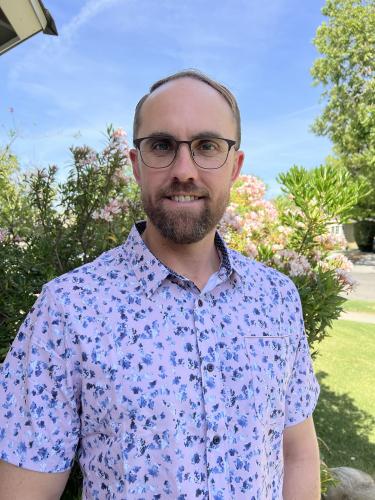
Parker Chamberlin found his calling through education, emerged from prison prepared to help others

Education was a form of salvation for Parker Chamberlin, who earned his bachelor’s degree in specialized studies in 2020 from Ohio University while incarcerated in California.
With encouragement and support from a close friend who insisted his incarceration should not be an excuse to give up on school, Chamberlin enrolled in correspondence courses, first through Indiana University, then through Ohio University’s print-based correctional education program, after completing his high school diploma.
It took him 17 years to complete his bachelor’s degree.
After being incarcerated from the age of 15 to the age of 36, Chamberlin was released earlier this year. He now works as the Director of In-Prison Programs for ReEvolution, a non-profit organization working to support people who are reentering their communities after incarceration and providing rehabilitative programming for incarcerated individuals. He works remotely from his home in Fresno, California, providing supervision to case managers who provide direct service. Chamberlin is also pursuing his master’s degree in social work through the University of Denver.
A fascination with psychology and sociology led Chamberlin to focus on those disciplines as he pursued his specialized studies degree, completing courses one at a time, using pen and paper and occasionally a typewriter to complete his assignments.
“School was for me, and remains for me, deeply personal,” Chamberlin said. “Some of the psychology classes that I took were really helpful in allowing me to understand myself and my journey, my decision making, and the consequences.”
Becoming a critical thinker
Chamberlin said his courses and educational experience were “transformative in the sense of offering me a very different perspective and teaching me how to be a critical thinker, which was for me much more than an intellectual endeavor.” He explained that pursuing his bachelor’s degree gave him a different way of thinking—and the ability to “resist the negative, often dangerous and violent influences of the prison yard.”
Completing a college degree via correspondence while incarcerated comes with a unique set of challenges, the largest of which was access to resources and information, according to Chamberlin. He learned to plan ahead and identify the resources he would need to complete his assignments and courses. Friends or family members would send him resources like newspaper articles, but he had to build in time to receive those materials by mail before completing assignments that were also submitted by mail. Any questions he had for his professors also had to be asked and answered via mail.
“There were occasions where I wanted to quit, wanted to just throw in the towel,” Chamberlin said.
His academic journey began at a time when he could not see the light at the end of the tunnel as he was unlikely to be released back to his community. He found motivation in the intrinsic value of education. Rather than viewing a bachelor’s degree as a path to a job, he saw the value in simply learning for the sake of learning and getting to learn more about himself and others. Chamberlin said he knew the path to attaining his bachelor’s degree would be a long one, but it would be worth it.
Chamberlin said he appreciated the help and support of Ohio University advisors like Tonga Cox and Ginny Cottrill who helped him navigate the logistics of correspondence courses and answer questions.
As a college student, Chamberlin valued learning psychological principles and stages of development, as well as sociological concepts, but also appreciated learning to be a critical thinker and gaining different perspectives.
‘This is my calling’
His Ohio University degree, along with his lived experience and connections with the ReEvolution organization, helped Chamberlin secure meaningful employment early in his reentry journey. Now he is helping to provide programming and support for incarcerated or formerly incarcerated individuals.
“This is my calling. Being of service to people, specifically this population, and to my community, is my calling,” Chamberlin said. “My path to incarceration included a tremendous amount of harm to many people, including my family and my community. Working in this field is a way for me to make amends or to continue making amends.”
He hopes to contribute to crime prevention and harm reduction through his work with incarcerated and formerly incarcerated populations.
“With this community, my community in this population (formerly incarcerated people) when people are doing well, they have jobs and they have stability in their social lives,” Chamberlin said. “They're making pro-social decisions, and they're not committing crime, and they're not harming people. I look at what I'm doing as a way of preventing the same sort of harm that I myself caused.”
Chamberlin said he found encouragement in reading stories about others who got an education and earned degrees while incarcerated. He hopes to provide encouragement to others who are seeking to gain knowledge and education while serving prison sentences. His key advice to incarcerated students is to stay focused on their goals and plan ahead, determining what resources and materials may be needed at the outset of each course.
Since 1974, Ohio University’s Correctional Education has provided an opportunity for incarcerated students to study through print-based courses, to earn college credit, and work toward an Ohio University degree. The Ohio University staff is dedicated to working with students and their families to provide college-level courses, degree programs, and certificates in a print-based format that is acceptable in most prison facilities. Ohio University is accredited by the Higher Learning Commission.
